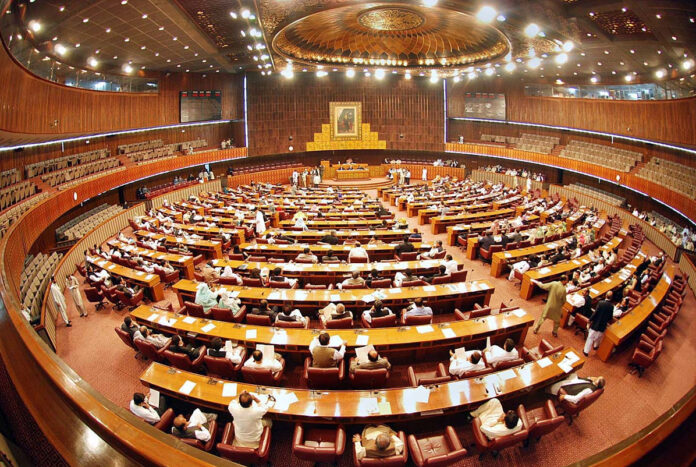ISLAMABAD: The government on Wednesday managed to get two Financial Action Task Force (FATF)-related bills–the Anti-terrorism (Amendment) Bill, 2020 and the United Nations (Security Council) (Amendment) Bill, 2020 — passed by the National Assembly (NA) amidst protests by the opposition.
The bills, moved by PM’s Adviser on Parliamentary Affairs Dr Babar Awan, were passed amid the opposition members’ sloganeering against Foreign Minister Shah Mahmood Qureshi’s speech in the assembly on Tuesday in which he had explained the deadlock between the government and the opposition over a number of legislations.
The noisy protest led the NA speaker to suspend proceedings on three occasions: twice when Qureshi refused to speak amid the opposition’s slogans and once soon after the passage of the bills.
In his remarks, Pakistan Muslim League-Nawaz (PML-N) MNA Khawaja Asif said he was speaking to present the opposition’s point of view on the foreign minister’s speech. He said Qureshi disclosed the details of an informal meeting between the government and opposition members held at the speaker’s residence.
“Nine members of the 25-member special parliamentary committee were having an informal meeting to discuss legislation on FATF and NAB (National Accountability Bureau). The issue was to go back to the main committee, but the foreign minister disclosed the details on the floor of the House which was against ethics and norms,” Asif added.
He said Qureshi had “crossed all the limits by disclosing details [of the meeting] which should have been kept secret” because the minister “wanted to do politics”.
“He (Qureshi) tried to give the impression that the opposition was only interested in NAB laws and not FATF. There was no need to bring these things on the record,” the PML-N lawmaker said.
He criticised Qureshi for not disclosing before the lower house that the two sides had, in fact, reached consensus on the two FATF-related bills on Tuesday.
“The opposition only wanted to stop the political use of the laws … We cannot allow 90 days’ detention under the pretext of economic terrorism,” he said, explaining why the two sides had disagreed on other FATF-related legislation on Tuesday.
“In the past, those who made the wrong laws, they themselves became their victim,” Asif said.
The speaker then gave Qureshi the floor three or four times to respond to Asif, but the minister refused to speak due to the opposition’s protest. The speaker and the deputy speaker asked him to continue his speech, but he said he would do so when there was silence and order in the House.
Instead of Qureshi, federal minister Murad Saeed responded to the opposition, accusing it of attempting to seek relief from the government for their alleged corruption. He said Prime Minister Imran Khan will not give any such “NRO” [National Reconciliation Ordinance].
Law Minister Naseem Faroqgh, while talking to media on Tuesday, had confirmed the deadlock in discussions between the government and the opposition and said the FATF-related legislation had to be passed before August 6 as it was a requirement for removing Pakistan from the ‘grey list’. He declared that the government would introduce the bills on its own before the deadline.
OPP LOOKS TO SENATE
Later in the day, PML-N president and leader of the opposition in the National Assembly Shehbaz Sharif reached out to PPP’s Bilawal Bhutto-Zardari and Jamiat Ulema-i-Islam-Fazl (JUI-F) chief Maulana Fazlur Rehman via phone to discuss the future course of action.
The three leaders decided to constitute a committee comprising senators from the joint opposition to deliberate the FATF-related legislation and ensure it is in the “country’s best interests”.
On Tuesday, Bilawal held back-to-back meetings with Rehman and Shehbaz in Lahore, ahead of the opposition’s multi-party conference (MPC) scheduled to be held after Eidul Azha.
Addressing the media after the meetings, Bilawal had said that all opposition parties were “on one page” in their movement against the PTI government, which he alleged had become a “hazard” for the country.




